| FEBRUARY 2023 |
| Postponement of one Kabuki program in February 2023 due to coronavirus (COVID-19)!!! |
|
3 shows in T˘ky˘ (Kabukiza), 2 in Fukuoka (Hakataza), 1 tour (Zenshinza) and
|
| Kabukiza (T˘ky˘) |  |
| Dates | 2 ~ 25 February 2023 Nigatsu ďkabuki February Grand Kabuki |
| 1st program |
Sannin Kichisa Tomoe no Shiranami |
| 2nd program |
Onna Kurumabiki |
| 3rd program | |
| Casting |
Living National Treasure Kataoka Nizaemon, Living National Treasure Nakamura T˘z˘, Nakamura Jakuemon, Nakamura Shikan, Nakamura Kaishun, Nakamura Ganjir˘, Nakamura Senjaku, Kataoka Ainosuke, Nakamura Shichinosuke, Kataoka Takatar˘, Onoe Sh˘roku, Nakamura Matagor˘, Band˘ Minosuke, Nakamura Kazutar˘, Nakamura Takanosuke, Kataoka Ichiz˘, Kamimura Kichiya, Band˘ Kamez˘, Nakamura Matsue, Nakamura Kash˘, Matsumoto Kingo, Sawamura S˘nosuke, Nakamura Tanenosuke, Kataoka Sennosuke, Kataoka Kamez˘, Nakamura Kichinoj˘, Kataoka Matsunosuke, Arashi Kitsusabur˘, Ichimura Kitsutar˘, Onoe Sakon |
| Comments |
The February Grand Kabuki at the Kabukiza to celebrate the 10th anniversary of the opening of the fifth Kabukiza. "Funa Benkei" is staged to commemorate the 12th anniversary (13th memorial service) of the passing away of Nakamura Tomijűr˘ V.
|
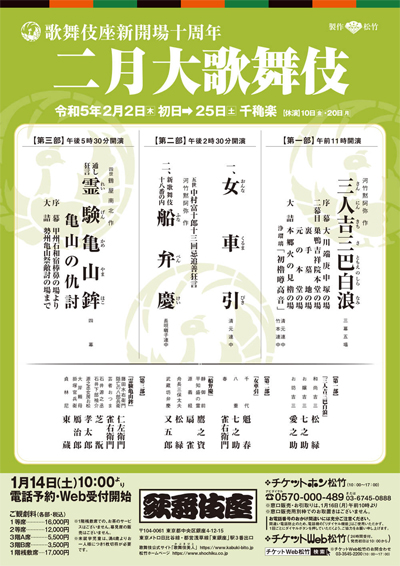 |
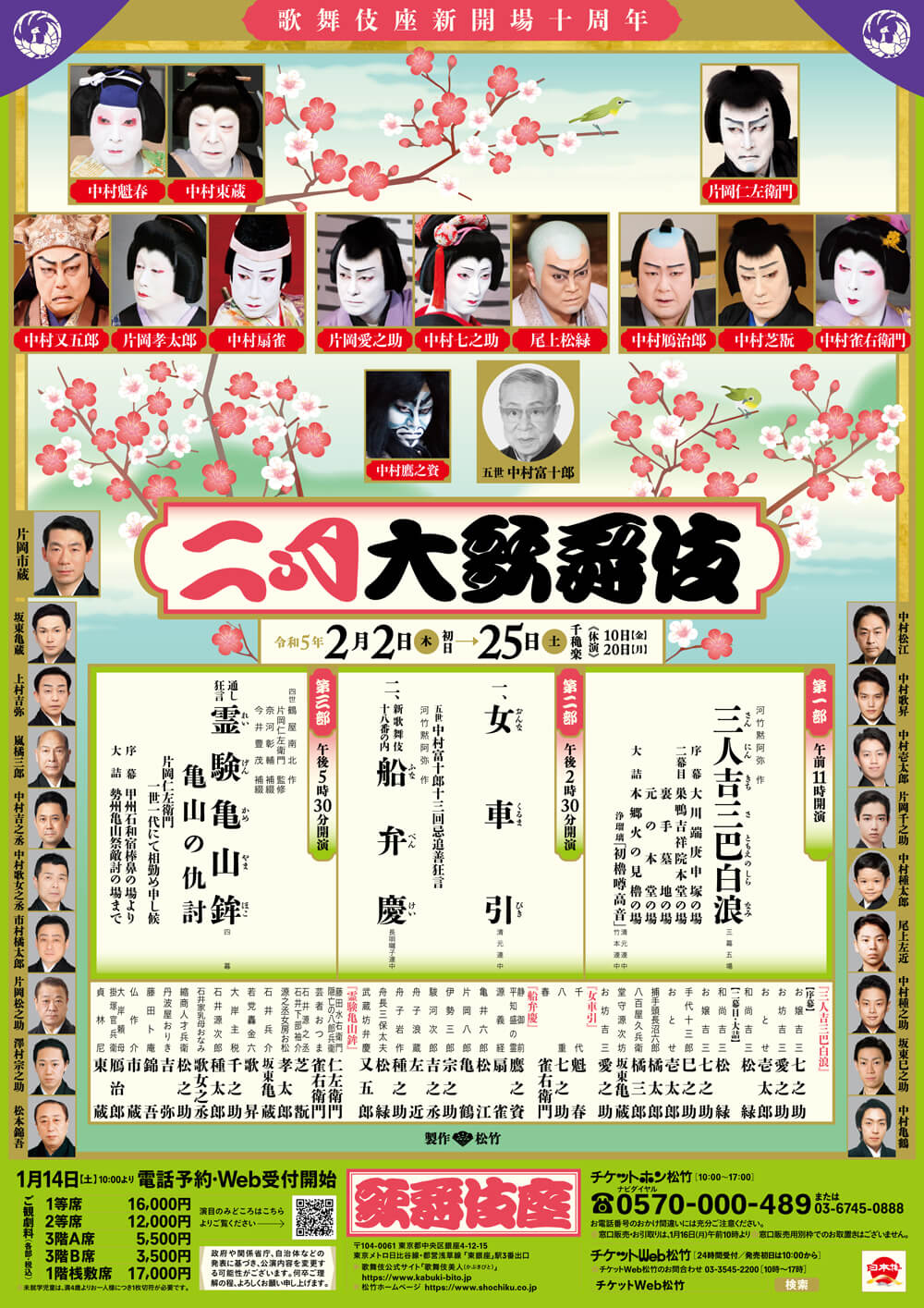 |
|
|||
| Dates | 5 ~ 19 February 2023 Nigatsu Hanagata Kabuki February Young Actors Kabuki |
||
| Program |
Shin Sangokushi |
||
| Casting |
Ichikawa Ennosuke, Ichikawa Monnosuke, Ichikawa En'ya, Ichikawa Emiya, Ichikawa Emisabur˘, Ichikawa Omez˘, Ichikawa Seiko, Band˘ Shingo, Nakamura Fukunosuke, Nakamura Baika, Ichikawa Danko, Ishibashi Sh˘ji, Asano Kazuyuki |
||
| Comments |
A special program in Fukuoka at the Hakataza starring Ichikawa Ennosuke! Ichikawa Seiko II celebrates his shűmei in Fukuoka at the Hakataza.
|
||
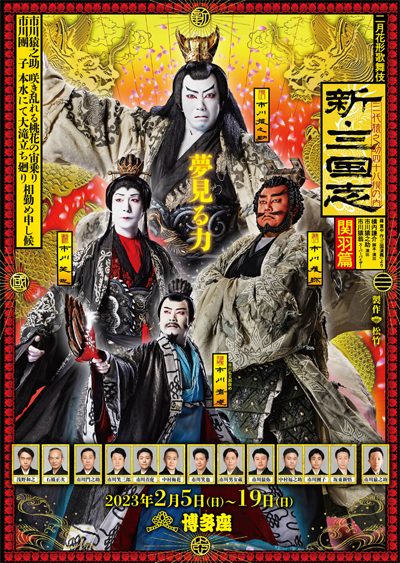 |
| Dates | 21 February 2023 Yume Miru Chikara ~ Tokubetsu Buy˘ K˘en Power to Dream ~ Special Dance Performances |
| Program |
Harugasumi Kabuki Z˘shi (Okuni Sanza) |
| Casting |
Ichikawa Seiko, Band˘ Shingo, Nakamura Fukunosuke, Ichikawa Danko, Ichikawa Utaki |
| Comments |
A special Buy˘ program in Fukuoka at the Hakataza.
|
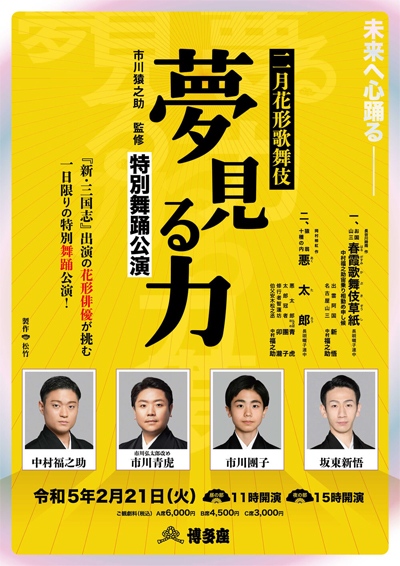 |
| Zenshinza Tour | |
| Dates | 26 January ~ 5 March 2023 |
| Program | |
| Casting |
Fujikawa Yanosuke, Yamazaki Tatsusabur˘, Nakajima K˘tar˘, Tamaura Yűnosuke, Hayase Einoj˘, Matsunami Kihachir˘, Arashi Ichitar˘, Watarai Motoyuki, Takei Shigeru, Ishijima Ryűsei |
| Comments |
A long tour for the Zenshinza troupe:
|
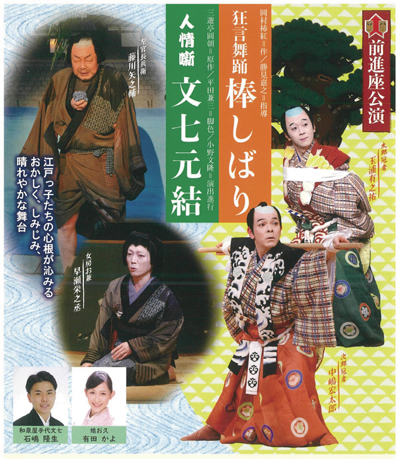 |
| ďtsuka Museum of Art (Naruto) |
| Dates | Sistine Kabuki |
| Program |
??? |
| Casting |
??? |
| Comments |
The 11th edition of the Sistine Kabuki, a Kabuki program within the Sistine Hall of the ďtsuka Museum of Art, which is located in the city of Naruto (Tokushima prefecture), has been postponed due to the COVID-19 crisis. |
|
|
| Contact | Main | Top | Updates | Actors | Plays | Playwrights | Programs | Links | FAQ | Glossary | Chronology | Illustrations | Prints | Characters | Derivatives | Theaters | Coming soon | News |
